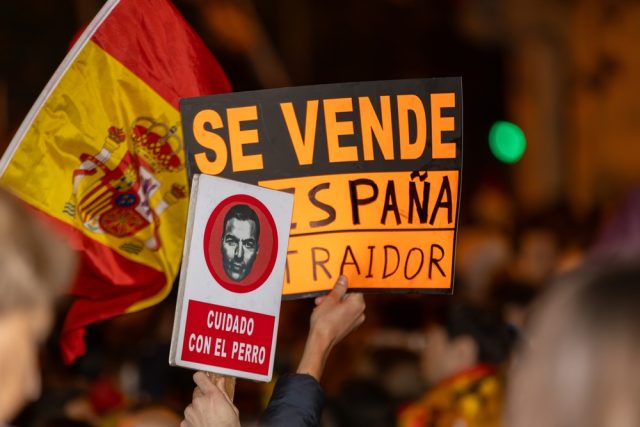
Prime Minister Pedro Sánchez’s Socialist government has once again yielded to separatist blackmail in order to maintain power.
The Congress Bureau has processed the vote of confidence request made by Junts per Catalunya, the party of fugitive and coup leader Carles Puigdemont, demonstrating that the Socialist government is willing to pay any price to stay in office.
This move marks the first “payment” to Carles Puigdemont and his party, who have made it clear that the government’s stability depends on their approval.
Since Sánchez secured his bid as Prime Minister with fragile parliamentary support, his strategy has been clear: offering privileges and concessions to separatist allies in exchange for their backing.
This time, Junts’ demand was for a vote of confidence that would allow Puigdemont to continue shaping the political agenda. Despite initial resistance from the PSOE, the party ultimately capitulated, another sign of the government’s weakness and lack of autonomy.
The process leading to the vote of confidence has been chaotic and revealing. After two failed attempts, the Congress Bureau, controlled by the Spanish Socialist Party (PSOE) and its progressive coalition parter Sumar, finally accepted Junts’ request. This turn of events highlights how Sánchez continues to subordinate Spain’s governance to the demands of a radical minority intent on undermining the state.
The vote will be debated and voted on in the coming weeks, ensuring another round of tensions and coercion.
While Sánchez speaks of “coexistence” and “dialogue,” the reality is that he is building his mandate on concessions that jeopardize the constitutional order.
The opposition, led by the Popular Party (PP) and Vox, has harshly criticized this maneuver.
The PP argues that the PSOE has betrayed its voters by yielding to an imposition from Puigdemont, a fugitive from justice who continues to exert influence over Spanish politics from Belgium.
The Conservative party Vox, in turn, has condemned the concession as further proof of the government’s “authoritarian drift,” acting behind the backs of citizens and the rule of law.
The underlying issue with this vote of confidence is clear: Prime Minister Sánchez has lost control of his own legislature and is now entirely dependent on the support of forces seeking to dismantle Spain. The policy of appeasement toward separatists is nothing new, but it has reached unprecedented levels. From granting pardons to eliminating the crime of sedition, the PSOE has paved the way for separatism to continue advancing its goals.
Politically, this situation also exposes the fragility of Sumar, the government’s junior partner.
Deputy Prime Minister and one of Sumar’s top voices, Yolanda Díaz, has kept a low profile on this matter, but her party has fully backed the vote of confidence process.
Moreover, this concession has significant economic and social consequences. While the government focuses on ensuring Sánchez’s political survival, citizens’ real problems are being sidelined. Inflation continues to hurt families, public debt is at historic highs, housing remains a critical issue, and insecurity is on the rise in cities including Catalonia’s own Barcelona.
Yet the Pedro Sánchez’s priority remains appeasing those who seek Spain’s breakup, a coalition of parties that extend beyond Junts, but includes Catalonia’s leftist party Esquerra Republicana, the Basque Nationalist Party, EH Bildu, and the Galician Nationalist Bloc (BNG).
Other concessions to Junts are expected to come into fruition, including tranferring inmigration management competencies from the National Government to the regional government of Catalonia, an unprecedented measure and a privilige not set to benefit any other Spanish Autonomous Community.
The votes of Junts will continue to be criticial to sustain Sánchez’s main legislative proposals, including a recently introduced Reduction of the Working Week from 40 to 37,5 hours.



 Subscribe
Subscribe